(REPOST: Aviva)
With speeding offences now at their highest since 2011, concerns are rising not just around personal safety, but also the environmental impact this may be having.
Following on from the discussion around speed for this year’s Road Safety Week, recent research from Aviva reveals the dark truths that lie beyond the crash:
Speeding is a major contributor to climate change
According to the European Environmental Agency, road transport is by far the largest contributor to CO2 emissions. When vehicles travel at higher speeds, they demand very high engine loads, which requires more fuel and leads to high CO2 emission rates. Therefore, speeding and global warming are directly connected.
Global warming is increasing the rate of natural disasters, melting glaciers, rising temperatures and sea levels, all of which are contributing towards the extinction of rare species, displacement of people and a refugee crisis. As Erik Solheim, head of UN Environment, pointed out recently, “we still find ourselves in a situation where we are not doing nearly enough to save hundreds of millions of people from a miserable future.”
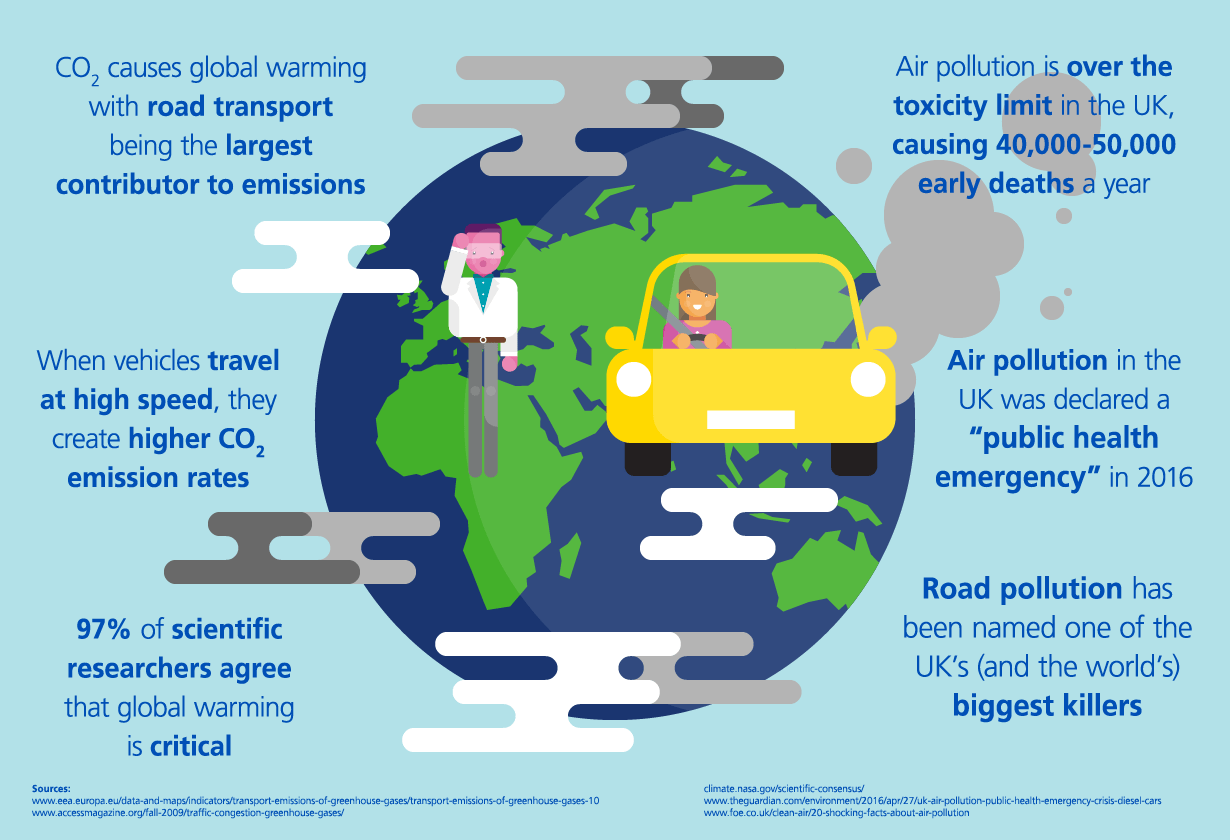
How can we make a difference?
The magnitude of this problem is overwhelming, but that doesn’t mean that we can’t all make a difference on a personal level. According to the Department for Transport, the CO2 emissions of a car are directly proportional to the quantity of fuel consumed by an engine.
Each mph you speed is more toxic (and expensive) than the one before. A car travelling at 80mph uses 10% more fuel than one cruising at 70mph. So, sticking to the speed limit on the motorway can reduce your carbon footprint by 10%, which is kinder to your pocket, fuel tank and the environment.
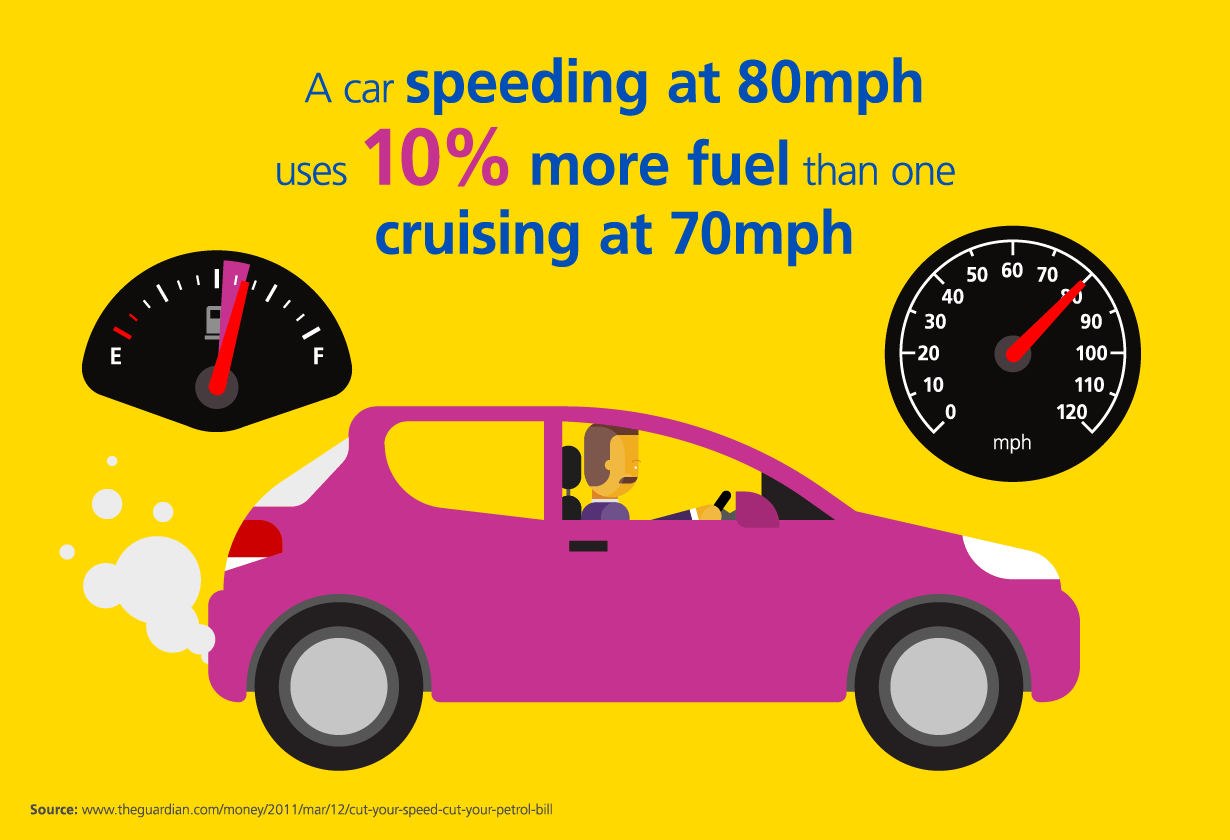
Air pollution is a bigger killer than road accidents
The impact of speeding-induced pollutants may be a lot closer to home than you realise. According to an MIT study of UK air quality, road pollution is more than twice as deadly to humans as traffic accidents. Air pollution in the UK was declared a “public health emergency” in 2016 and continues to breach the toxicity limit, causing 40,000-50,000 early deaths a year.
It’s not just the air that’s killing us. Research shows that noise pollution affects a huge number of people and is a significant risk to public health. Road traffic and aircraft noise increase the risk of high blood pressure, stroke and heart attack.
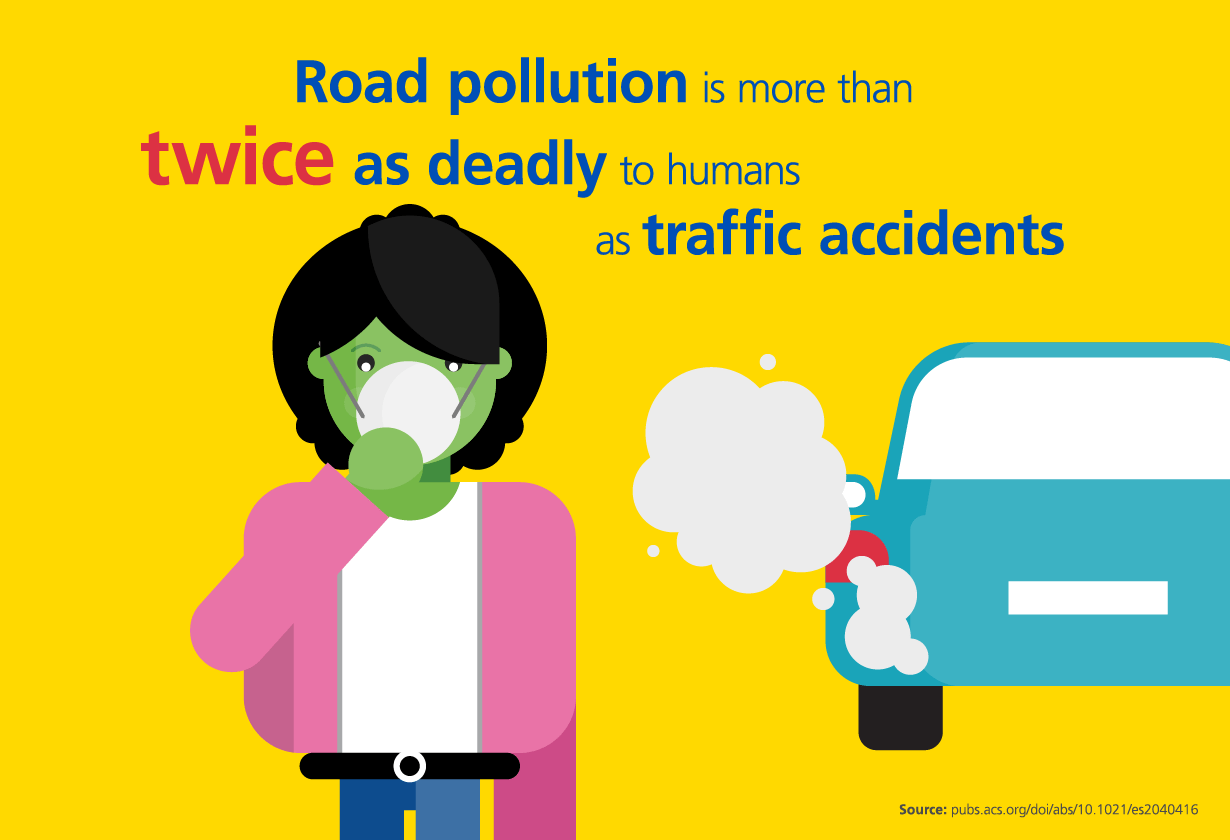
How can we reduce our pollution emissions?
The best thing you can do is to walk or cycle wherever possible. Looking to buy a new car? Consider going electric, as this will significantly cut your carbon emissions. Carpooling and public transport are also options but won’t tackle the root cause of the problem, unless the vehicle is electric of course.
There are also simple ways to make your driving cleaner and greener.According to the Department For Transport, slow and steady saves the planet (and pounds) as driving smoothly at 50mph instead of 70mph can improve fuel economy by 25%. Turn off your engine in stationary traffic jams and avoid rapid acceleration or harsh braking to reduce both fuel emissions and toxic brake particles.
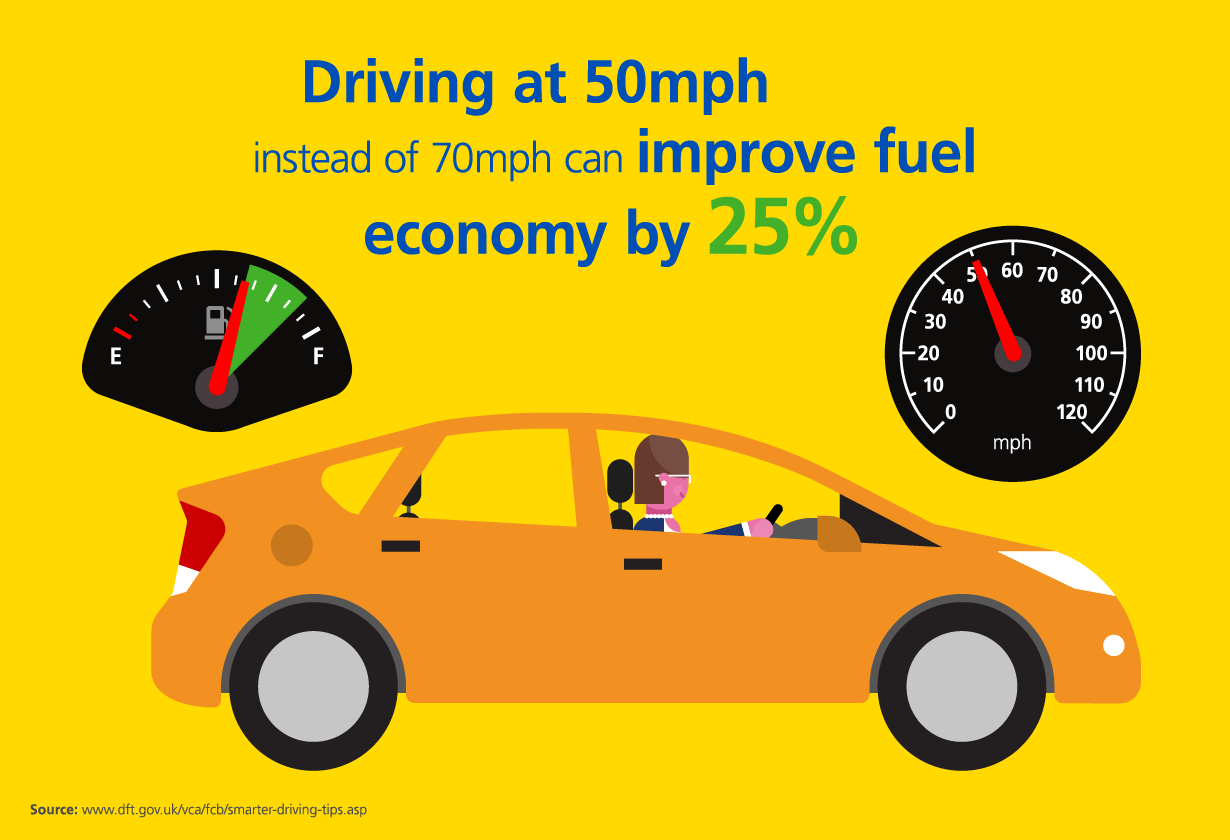
Wildlife suffers and so does your car
A third of animals are vanishing as roads spread through forests. Speeding destroys wildlife and it destroys your car. The number of animals killed on the roads in the United States is estimated at a million per day, whilst up to 27 million birds are likely to be killed on European roads each year. The UK National Deer-Vehicle Collisions Project estimates that 74,000 deer are involved in vehicle collisions each year in Britain, and the cost of damage to vehicles alone is at least £17 million.
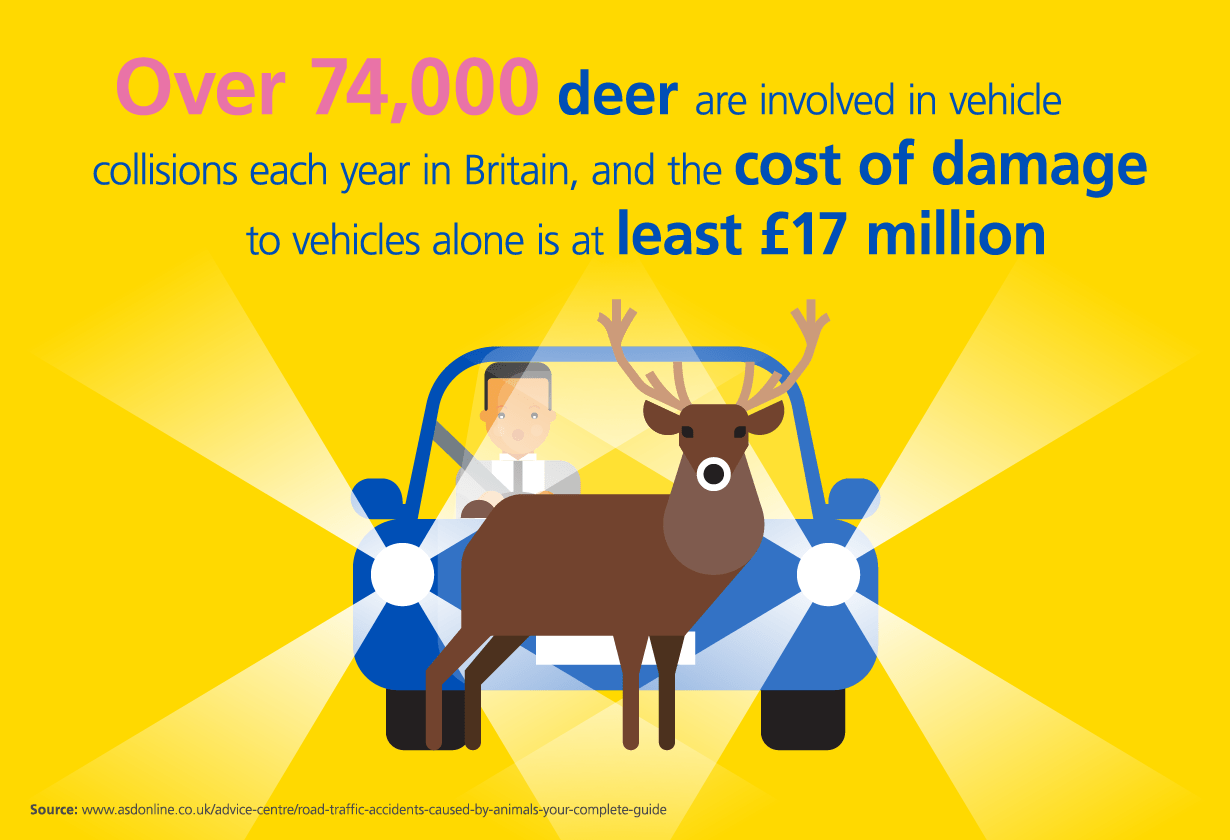
How can we protect our wildlife?
It’s pretty simple. The faster you drive, the longer it takes to stop. At 70mph, it takes 96m to stop after hitting the brakes, whereas at 50mph the stopping distance is almost halved (53m). As your speed increases, so do your chances of hitting an animal.
But what if something runs out in front of you? If it’s small like a rabbit or squirrel, then you shouldn’t swerve. If it’s larger like a deer or horse, then avoid the animal at all costs as it could cause serious damage to you and your car.
Speeding is self-destructive
In an increasingly fast paced world, we live under a weight of high stress demands, so it’s no wonder we’re always in a rush. But this exhausting speed is detrimental to our mental health. According to Dr Chris Tennant of the London School of Economics: “Drivers themselves create the very environment they often find stressful and to which they can respond combatively.”
Our recklessness on the road also impacts the mentality of others. Even a minor action can have a profound psychosocial effect on those around you – and it sets the tone for the society we are a part of. Dr Tennant calls this the “ripple effect”. In a survey of nearly 9,000 people, 87% agreed that when one driver helped them, they were more likely to help another later on their journey – and the converse can also be true.
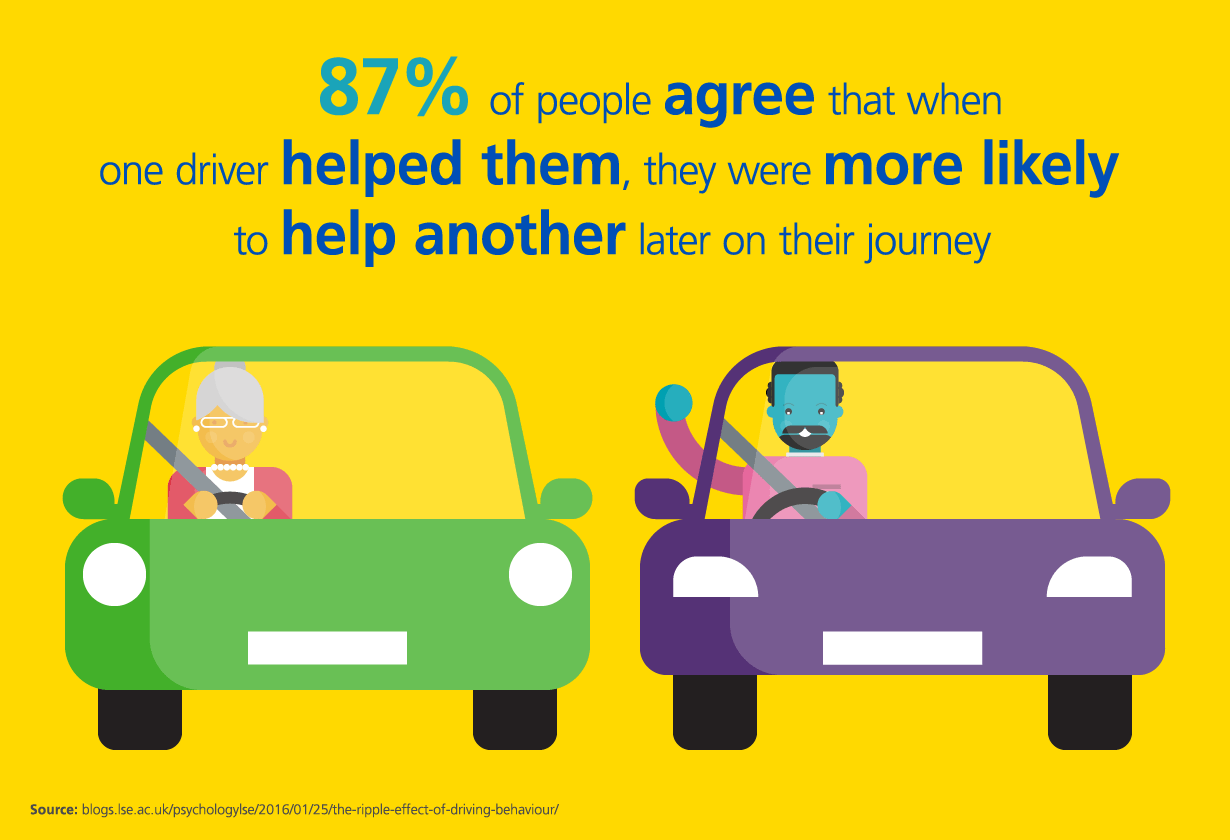
How can we break the speeding cycle?
We cannot control what happens to us, but we can control how we react. We often take it personally when someone “offends” us on the roads, yet when we respond negatively, we are engaging in the very behaviour that is instigating our suffering. In the same way, if we are considerate on the roads, we can generate a ripple effect of mutually kinder and safer journeys.
You’d be surprised how much you can enjoy your commute to work when you take the time to be mindful on the roads and engage with your surroundings. Allow more time for your journey by leaving earlier so you don’t have to rush. Try to observe and learn from everything you see – driving can become a therapeutic, relaxing and even enjoyable part of your day.
Small differences on the road = big differences to the planet
We’re all responsible for the damage that’s being caused by our speed. It’s polluting our environment, our bodies and our minds. If we want to remove the fear and uncertainty that’s driving unhealthy, unsafe and chaotic roads, we must first look to make ourselves cleaner and kinder drivers.
Source: Beyond the crash: 8 other reasons not to speed


